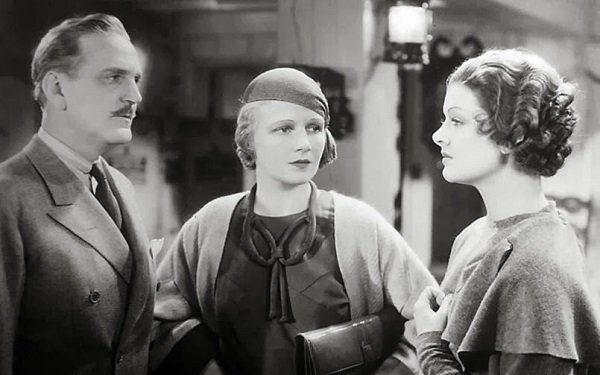
Quick! Name the Golden Age movie stars pictured above!
Some will know this answer, but most will not. Depending on one’s
point of view, this can be seen as either a weakness for TCM or a strength.
It is possible that top management at Warner Bros. Discovery sees the obscurity
of much of TCM’s content -- such as the movie above titled “When Ladies Meet” from 1933 -- as a weakness. After all, they are in the business of building audiences, not tolerating
tiny ones.
Others -- such as long-time fans and movie buffs for whom TCM is some sort of cinema temple -- see the unfamiliarity of many of the TCM titles as
its greatest strength.
advertisement
advertisement
Thanks to the curators at TCM who dig deeply into the inventory of movies available to TCM, movie buffs get to experience hundreds of
movies they might not otherwise have heard of, much less seen.
The catalyst for this rumination is the recent news that WBD tried to execute a sweeping
restructuring of TCM’s upper management and then had to walk back that plan.
This aborted change in management was attempted last month. It was deemed
so alarming that it drew the attention of three directors.
Indeed, many saw the restructuring as some sort of death knell for TCM.
Those let go were Pola Changnon, executive vice president and general manager of TCM; Charlie Tabesh, senior vice president of programming and content strategy; Dexter
Fedor, vice president of brand creative and marketing; Genevieve McGillicuddy, vice president of enterprises and strategic partnerships; and Anne Wilson, vice president of studio
production.
About half of TCM’s 40 staff members were also let go, according to The Wall Street Journal. At the time, the reason for the layoffs
that circulated in the news reports was cost-cutting.
Under the leadership of Warner Bros. Discovery
President and CEO David Zaslav, WBD has been on a cost-cutting campaign ever since Discovery merged with Warner Bros.
The attempted restructuring has been
credited to Zaslav. In its wake, Steven Spielberg, Martin Scorsese and Paul Thomas Anderson literally declared the situation to be an “emergency.”
They just couldn’t stand for it. So they made a fuss, then met with Zaslav, who agreed to a concession or
two.
Among them was restoring Charlie Tabesh to the job he had just lost -- senior vice president of
programming and content strategy.
The directors, who to my knowledge have little or no stake in TCM financially or otherwise, then issued a victory
statement.
“We have each spent time talking to David [Zaslav], separately and together, and it’s
clear that TCM and classic cinema are very important to him. Our primary aim is to ensure that TCM’s programming is untouched and protected.
“We are heartened and encouraged by the conversations we’ve had thus far, and we are committed to working together to ensure the continuation of this cultural touchstone that we
all treasure,” said the statement.
And just like that, TCM’s vast movie catalog will now be forever under the protection of Spielberg, Scorsese
and the other director Anderson. Or something like that.
It is ironic that their most famous movies are not under the same protection. For all of Martin
Scorsese’s efforts at promoting the restoration of the world’s cinematic heritage, there has never been a peep out of him about how his own movies have been treated for decades on
television.
They have been reformatted, chopped up and bleeped into near-total incomprehension. I realize he does not “own” his pictures, per se,
but neither does he “own” TCM. And yet, he didn’t hesitate to lecture WBD management about the sanctity of “TCM’s programming.”
In the vast pantheon of TV content platforms, TCM stands alone. It is a basic cable channel with almost universal carriage that has no advertising.
Indeed, unlike the rest of television where the atmosphere is loud, profane, violent and coarse, the tone of TCM is like that of a hushed library where voices are soft and the collection is
discussed with reverence and erudition.
The TV Blog likes TCM as much as the next person, but the opinion here is that aspects of TCM have gone stale.
Or to put it another way, how many times can a person watch “Singin’ in the Rain”? Maybe it is time for new blood.
Oh, before I
forget, the stars in the photo above, from left to right are: Frank Morgan (who later played the hapless wizard in “The Wizard of Oz”), Ann Harding and Myrna Loy.
The movie, “When Ladies Meet,” has been available to watch for the last few weeks for free on TCM On-Demand.
Usually, the TCM On-Demand movies are added after they are shown on TCM. If this movie got more than 10 people to watch it over the last few weeks, then that would be a
huge surprise. But without advertising, I suppose audience tonnage at TCM is not the point.